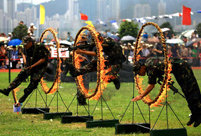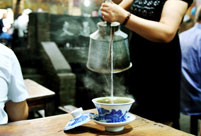 Vintage cars show kicks off in London
Vintage cars show kicks off in London
 Gorgeous scenery in NE China
Gorgeous scenery in NE China
 Picturesque Barkol grassland in Xinjiang
Picturesque Barkol grassland in Xinjiang
 Small Wild Goose Pagoda - A World Cultural Heritage Site along the Silk Road
Small Wild Goose Pagoda - A World Cultural Heritage Site along the Silk Road
 Maritime Silk Road Luxuries of the Han Dynasty
Maritime Silk Road Luxuries of the Han Dynasty
 Ciao! Chinese beauties!
Ciao! Chinese beauties!
 An eye feast: BFA freshmen registration
An eye feast: BFA freshmen registration
 Top 10 most lavish weddings
Top 10 most lavish weddings
 Most amazing chi-pao beauties
Most amazing chi-pao beauties
 Chinese lingerie brand arrives in Las Vegas
Chinese lingerie brand arrives in Las Vegas
INCHEON, South Korea, Sept. 23 -- With the highest score of 94.9667 in free combination event, China swept all three gold medals in synchronized swimming at Asiad which wrapped up on Tuesday afternoon.
Ten Chinese synchro swimmers beautifully presented the story of Phantom of the Opera with powerful lifts, flying and dazzling somersaults.
Chinese team overwhelmed other teams in all three categories of execution, artistic impression and difficulty. Their closest rival, Japan, was 2.3667 points behind.
Huang Xuechen, who played "phantom" in the performance, said the swimmers had watched the movie four or five times together and everyone has her own role in the show.
The current Chinese team was formed only in October last year.
"We are a new team but we are an excellent team," Chinese swimmer Chen Xiaojun said. However the girls had trained very hard to follow the coaches' instructions.
Former Chinese head coach Yu Li said the secret for this young team to get two gold medals at the Asian Games is that they especially improved their arm strength.
"They've been training to follow the world's trend of more and faster arm movements in synchronized swimming," Yu said.
"Judging from their performances at the Asian Games, they become more confident and better in the artistic expression," Yu said.
Having said that, Yu added, the Japanese are right to say that China's duets swimmers need to improve their momentum and speed.
With the help of Masayo Imura, so-called Mother of Synchro, China has been dominating synchro swimming in Asia since 2006 and managed to get bronze and silver medals at Beijing and London Olympic Games.
As Imura returned to her home country of Japan this year and a few Chinese synchro swimmer stars such as Jiang Wenwen and Jiang Tingting retired last year, Japan sees a chance to outclass its biggest rival in Asia.
Japanese coach said Japanese swimmers improved greatly in their artistic appeal and accuracy, especially in leg movements.
Before these Games, Japanese media had discussed the possibility of Japan beating China.
The fact that China took all three synchro swimming golds at Asian Games shows that Japan still has a long way before catching up its neighbor.
Imura was clear about that. "It won't be easy for Japan to surpass China," she said.
Tuesday's free combination result confirmed her judgment.
"Japan is lagging behind in many ways. All the Chinese girls are tall and in good figure. They are also experienced in international competition," Imura said.
The Japanese team is especially disappointing in handling pressure at a high-level event, she said.
"At the National Championship this June, the Japanese girls even talked to each other when making their entrance. They explained afterwards that it was for relaxing themselves. As a contrast, the Chinese girls would take pressure as stimulation."
Imura was extremely harsh on the Japanese swimmers by calling them "totally unprepared" for these Asian Games and being "at an elementary level in almost every aspect, especially in their way of thinking and mindset".
Bagging all golds at Asian Games, the Chinese put their eyes on stronger teams such as Russia.
"Our goal is to learn from the Russians," Huang said.
 Military training in Hong Kong
Military training in Hong Kong Teahouses in Chongqing: Worship to the leisure lifestyle
Teahouses in Chongqing: Worship to the leisure lifestyle Giant white gourd weighing 87 kilograms appears in SE China
Giant white gourd weighing 87 kilograms appears in SE China Advanced arms help to safeguard China-ASEAN Expo
Advanced arms help to safeguard China-ASEAN Expo Leading director Wang Quan'an detained for 'buying sex'
Leading director Wang Quan'an detained for 'buying sex' Heaven on earth: Dongjiang Lake in Hunan
Heaven on earth: Dongjiang Lake in Hunan Mixed reaction to smartphone sidewalk
Mixed reaction to smartphone sidewalk Amazing aerial photos of China's Xisha Islands
Amazing aerial photos of China's Xisha Islands Top 10 world's highest-paid models 2014
Top 10 world's highest-paid models 2014 Lingerie show at 2014 Miss China
Lingerie show at 2014 Miss China Songstress Li Xianglan dies at 94
Songstress Li Xianglan dies at 94 Police recruiting posters
Police recruiting posters Anshun Daxi- Living fossil of Chinese drama
Anshun Daxi- Living fossil of Chinese drama Urban farmers in China
Urban farmers in China 'Firepower-2014 Weibei'military exercise
'Firepower-2014 Weibei'military exerciseDay|Week|Month